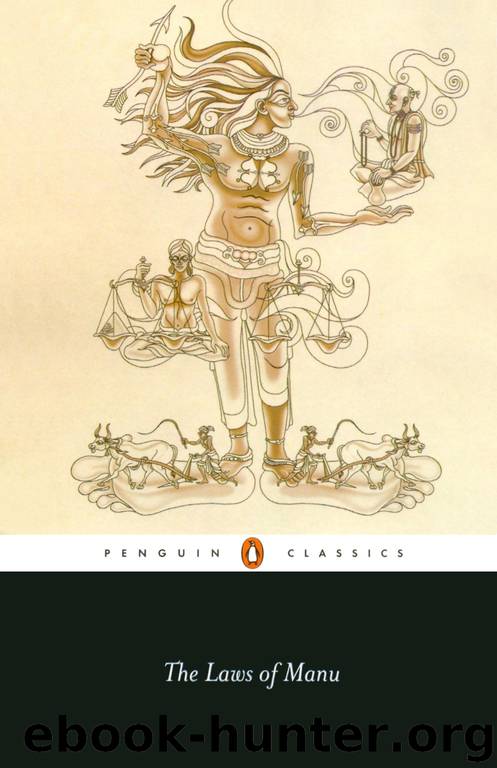The Laws of Manu (Classics) by Unknown

Author:Unknown
Language: eng
Format: epub
ISBN: 9780141966625
Publisher: Penguin Books Ltd
Published: 2017-05-28T16:00:00+00:00
CHAPTER 9
[1] I will tell the eternal duties of a man and wife who stay on the path of duty both in union and in separation. [2] Men must make their women dependent day and night, and keep under their own control those who are attached to sensory objects. [3] Her father guards her in childhood, her husband guards her in youth, and her sons guard her in old age. A woman is not fit for independence. [4] A father who does not give her away at the proper time should be blamed, and a husband who does not have sex with her at the proper time should be blamed; and the son who does not guard his mother when her husband is dead should be blamed.
[5] Women should especially be guarded against addictions, even trifling ones, for unguarded (women) would bring sorrow upon both families. [6] Regarding this as the supreme duty of all the classes, husbands, even weak ones, try to guard their wives. [7] For by zealously guarding his wife he guards his own descendants, practices, family, and himself, as well as his own duty. [8] The husband enters the wife, becomes an embryo, and is born here on earth. That is why a wife is called a wife (jāyā), because he is born (jāyate) again in her. [9] The wife brings forth a son who is just like the man she makes love with; that is why he should guard his wife zealously, in order to keep his progeny clean.
[10] No man is able to guard women entirely by force, but they can be entirely guarded by using these means: [11] he should keep her busy amassing and spending money, engaging in purification, attending to her duty, cooking food, and looking after the furniture. [12] Women are not guarded when they are confined in a house by men who can be trusted to do their jobs well; but women who guard themselves by themselves are well guarded. [13] Drinking, associating with bad people, being separated from their husbands, wandering about, sleeping, and living in other people’s houses are the six things that corrupt women. [14] Good looks do not matter to them, nor do they care about youth; ‘A man!’ they say, and enjoy sex with him, whether he is good-looking or ugly. [15] By running after men like whores, by their fickle minds, and by their natural lack of affection these women are unfaithful to their husbands even when they are zealously guarded here. [16] Knowing that their very own nature is like this, as it was born at the creation by the Lord of Creatures, a man should make the utmost effort to guard them. [17] The bed and the seat, jewellery, lust, anger, crookedness, a malicious nature, and bad conduct are what Manu assigned to women. [18] There is no ritual with Vedic verses for women; this is a firmly established point of law. For women, who have no virile strength and no Vedic verses, are falsehood; this is well established.
Download
This site does not store any files on its server. We only index and link to content provided by other sites. Please contact the content providers to delete copyright contents if any and email us, we'll remove relevant links or contents immediately.
Fingersmith by Sarah Waters(2531)
Kundalini by Gopi Krishna(2177)
Wheels of Life by Anodea Judith(2140)
Indian Mythology by Devdutt Pattanaik(1931)
The Bhagavad Gita by Bibek Debroy(1918)
The Yoga of Jesus: Understanding the Hidden Teachings of the Gospels by Paramahansa Yogananda(1845)
Autobiography of a Yogi (Complete Edition) by Yogananda Paramahansa(1809)
The Man from the Egg by Sudha Murty(1803)
The Book of Secrets: 112 Meditations to Discover the Mystery Within by Osho(1658)
Chakra Mantra Magick by Kadmon Baal(1637)
The Sparsholt Affair by Alan Hollinghurst(1583)
Gandhi by Ramachandra Guha(1525)
Sparks of Divinity by B. K. S. Iyengar(1520)
Avatar of Night by Tal Brooke(1516)
Karma-Yoga and Bhakti-Yoga by Swami Vivekananda(1487)
The Bhagavad Gita (Classics of Indian Spirituality) by Eknath Easwaran(1475)
The Spiritual Teaching of Ramana Maharshi by Ramana Maharshi(1424)
Hindoo Holiday by J. R. Ackerley(1370)
Hinduism: A Very Short Introduction (Very Short Introductions) by Knott Kim(1365)
